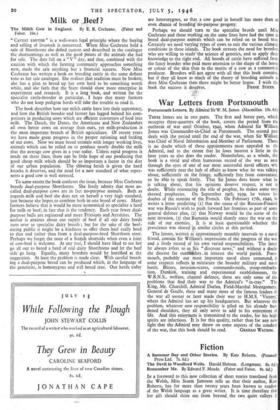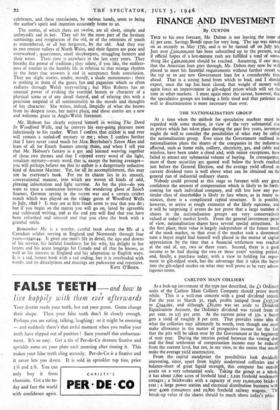Fiction
IN a foreword to this new collection of short stories translated from the Welsh, Miss Storm Jameson tells us that their author, Kate Roberts, has for more than twenty years been known to readers of the Welsh language as a great writer. It is time therefore that her gift should shine out from beyond, the two quiet valleys it celebrates, and .these translations, by various hands, seem to bring the author's spirit and intention accurately home to us.
• The stories, of which there are twelve, are all short, simple and unforcedly sad in key. They tell for the most part of the hesitant surmisings and resignation of the old, or of the emotions of youth as remembered, or all but forgotten, by the old. And they stay in two remote valleys of North Wales, and their figures are poor and overworked ; quarrymen, small shopkeepers, struggling farmers and their wives. Their time is anywhere in the last sixty' yearS. They breathe the power of tradition ; they salute, if you like, the endless- ness of routine in the humble life in relation to that strange rhythm in the heart that answers it and in acceptance finds consolation. They are slight stories, tender, moods', a shade monotonous there is nothing in them of the gusto, fun and paganism which so often radiates through Welsh story-telling ; but Miss Roberts has an unusual power of evoking the essential beauty or character of a physical scene or of any detail thereof, and of relating this with a precision emptied of all sentimentality to the moods and thoughts of her character. She writes, indeed, limpidly of what she knows from its deepest roots, her native place, and these stories are a new and welcome grace in Anglo-Welsh literature.
Mr. Hobson has clearly enjoyed himseli in writing The Devil In Woodford Wells, and he conveys his• easy-going pleasure most infectiously to his reader. When I confess, that cricket is and ever will remain a sealed-off mystery to' me ; when I confess further that I have never cared much for Max,.Beerbohni's Seven Men and least of all for Enoch Soames among thetn, and' when I tell you that Mr. Hobson's fantasy is a gay and learned weaving together of these two themes and that I enjoyed every word of the light, resultant mystery—every word, that is, except the batting averages— you will perhaps believe me that its author is a dangerously seductive kind of Ancient Mariner. Yet, for all its accomplishment, this may not be everyone's book. For me its charm lies in its smooth, conversational manner, into which are woven all kinds of odd, pleasing information and light surmise. As for the plot—do you want to trace a connection between the wandering ghost of Enoch Soames, German spying in the recent war and a certain cricket match which was played on the village green of Woodford Wells in July, 1808 ? It may not at first blush seem to you that you do ; but if you begin on the matter you will go on, lured by agreeable and cultivated writing, and at the end you will find that you have been refreshed and amused and that you close the book with a grateful smile.
Remember Me is a worthy, careful book about the life of a Canadian soldier serving in England and Normandy through four years-1940-44. It gives one man's life in detail, the ups and downs of his service, his faithful loneliness for his wife, his delight in her letters and his acute longings for Canada and all that he knows, as well as his interest in England and his adaptation to English ways. It is a sad, honest book with a sad ending, but it is overloaded with words, and its descriptions and musings are pedestrian and repetitive.
KATE O'BRIEN.



























 Previous page
Previous page